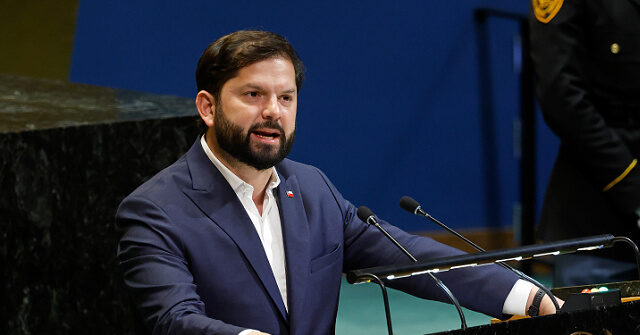President Gabriel Boric of Chile, a radical leftist who once described himself as “to the left of the Communist Party,” condemned the socialist dictatorship of Venezuela in remarks on Wednesday, linking dictator Nicolás Maduro to the assassination of a Venezuelan dissident on Chilean soil.
Boric has been consistently critical of the human rights atrocities and critical activities of the Maduro regime — a surprise after winning the presidency in 2021 with Communist Party backing. While Boric has remained stridently left-wing on domestic issues such as crime and health care, he has carved a lonely path geopolitically as one of the few left-wing leaders around the world willing to repeatedly distance his government from Caracas.
The Chilean president was speaking in Rome at an event to mark the anniversary of the failed assassination of Chilean leftist Bernardo Leighton in 1975, reportedly staged by right-wing figures with ties to the government of then-leader Gen. Augusto Pinochet. Rather than limit his remarks to condemning the global right-wing, Boric compared the situation to the killing of Ronald Ojeda, a dissident Venezuelan lieutenant who escaped to Chile in 2017 and became a vocal critic of the regime. Ojeda’s body was found in a suitcase under a concrete structure in Santiago, the Chilean capital, in March 2024. He disappeared from his home a month prior.
“Dictatorships and authoritarian leaders cross borders,” Boric warned in his remarks on Wednesday. “I think this is especially relevant today, 50 years later, when we see how in the world different international [movements] are created and elevated that promote hate and intolerance.”
“In the face of intolerance, before hate, progressive forces should respond, not just pointing a finger and saying that there is a threat here, but offering a better alternative, of progress, of humanity,” Boric asserted.
He then turned his remarks not to the right, but to the left.
“Without going beyond Chile, we have the case of the assassination of a former Venezuelan soldier, where one of the suspects of having perpetrated the assassination is the very regime of dictator Nicolás Maduro,” Boric asserted, “who steals elections in his country.”
“It is important to say from the left that we cannot lose sight of the fact that authoritarian deviations can be at the order of the day anywhere, and the defense of democracy must be without double standards,” he affirmed, “that the defense of human rights is always because human rights are a civilizational advance and not the birthright of any particular political sector.”
Boric’s accusation was based on the results of investigations by Chilean prosecutors, who identified three men impersonating police officers as approaching Ojeda’s door and taking him shortly before his disappearance. The top prosecutors in Chile found evidence linking the suspects to the Tren de Aragua, a transnational criminal organization with close ties to the Maduro regime. Once a criminal gang whose influence was limited to its home country, the Tren de Aragua became a transcontinental threat after Maduro “raided” the Tocorón prison in Aragua, housing most of the leadership of the gang. The “raid” resulted in the gang leaders fleeing and, some months later, American and other international law enforcement agencies identifying Tren de Aragua members committing crimes in their local communities.
Beyond the Tren de Aragua, Chilean authorities named one of the suspects in the Ojeda killing as a former Venezuelan government employee.
In June 2024, following revelations linking the Maduro regime to the killing, Maduro’s “attorney general,” Tarek William Saab, accused Boric’s government directly of staging the murder. Saab called the killing a “false flag” operation intended to discredit Maduro, to which Boric’s government issued a formal diplomatic complaint.
“Chile is a serious country, where institutions work, where there is separation of powers and where the Prosecutor’s Office is carrying out a responsible investigation,” Boric said.
Saab resurfaced on Thursday following Boric’s speech this week, calling the Chilean president “repudiated, hated by the people.”
“An heir to Pinochet like Boric has no moral standing to be talking about Venezuela, of our uniqueness, of our sovereignty,” Saab railed, disregarding the fact that Boric is an aggressive opponent of the politics that Pinochet promoted. Saab denied any Venezuelan government participation in Ojeda’s killing, offering no evidence. He did not repeat his unsubstantiated accusation that Boric was responsible.
Boric has repeatedly incurred the ire of the Maduro regime by insisting that the global left should repudiate it. In May, Boric condemned the regime to Maduro’s face at a summit of Latin American leftist presidents.
“It is the first time that many of us have the chance of engaging face-to-face with President Maduro of Venezuela. I salute and applaud that Venezuela returns to multilateral spaces,” Boric said. “But I have to say that the human rights crisis in Venezuela – and in this I differ with President Lula – is not a constructed narrative. It is real, in flesh and bone.”
Boric was referring to socialist Brazilian President Luiz Inácio Lula da Silva, who had dismissed the decade-long list of human rights atrocities attributed to Maduro as a media “narrative” at the same event.
Follow Frances Martel on Facebook and Twitter.
Read the full article here



